下面是出国留学网提供的春节英语手抄报图片,欢迎查看。
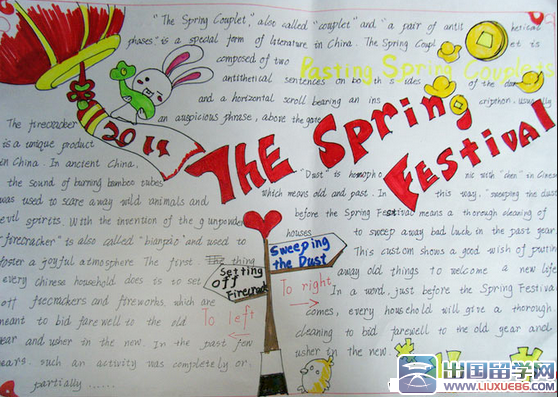
春节祝福语 英语
Best wishes for the holidays and happiness throughout the New Year.
恭贺新禧,万事如意。
Good luck in the year ahead!
祝吉星高照!
May you come into a good fortune!
恭喜发财!
Live long and proper!
多福多寿!
May many fortunes find their way to you!
祝财运亨通!
I want to wish you longevity and health!
愿你健康长寿!
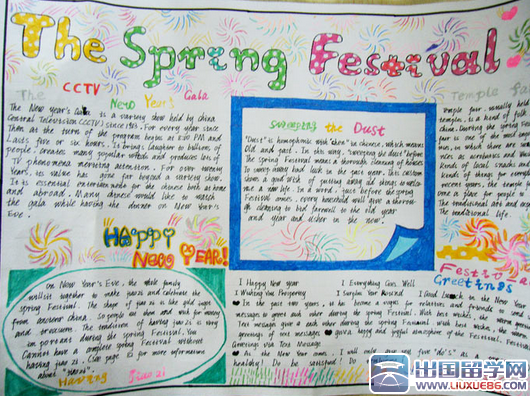
I wish you good health in the new year.
祝你身体健康。
Warm wishes to you and your family for a wonderful New Year!
祝你和你的家人有个美好的新年
Wishing you a happy and abundant New Year!
祝你有个愉快和丰盛的新年!
With very best wishes for your happiness in the New Year.
致以最良好的祝福,原你新年快乐幸福。
Good luck, good health, hood cheer. I wishyou a happy New Year.
祝好运、健康、佳肴伴你度过一个快乐新年。
With best wishes for a happy New Year!
祝新年快乐,并致以良好的祝福。
I hope you have a most happy and prosperous New Year.
谨祝新年快乐幸福,大吉大利。
With the compliments of the season.
祝贺佳节。
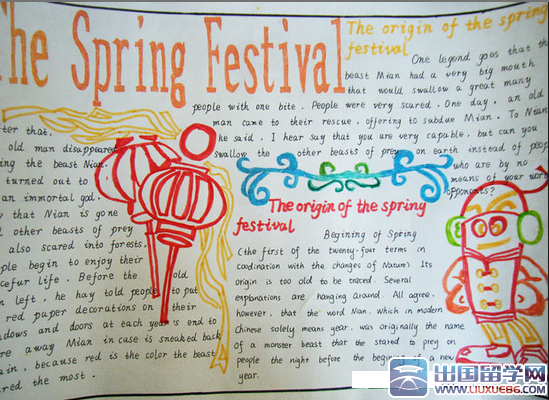
A happy New Year to you.
恭贺新年。
Season's greetings and sincere wishes for a bright and happy New Year!
献上节日的问候与祝福,愿你拥有一个充满生机和欢乐的新年。
I give you endless brand-new good wishes. Please accept them as a new remembrance of our lasting friendship.
给你我无尽的新的祝福,让它们成为我们永恒友谊的新的纪念。
Good luck and great success in the coming New Year.
祝来年好运,并取得更大的成就。
On the occasion of the New Year, may my wife and I extend to you and yours our warmest greetings, wishing you a happy New Year, your career greater success and your family happiness.
在此新年之际,我同夫人向你及你的家人致以节日的问候,并祝你们新年快乐、事业有成、家庭幸福。
May everything beautiful and best be condensed into this card. I sincerely wish you happiness, cheerfulness and success.
愿一切最美好的祝福都能用这张贺卡表达,真诚地祝你幸福、快乐、成功。
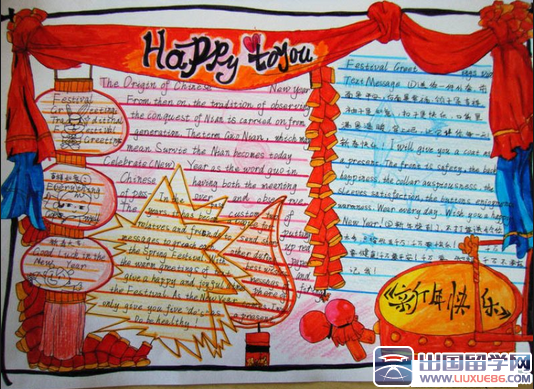
May the season's joy fill you all the year round.
愿节日的愉快伴你一生。
Season's greetings and best wishes for the New Year.
祝福您,新年快乐。
Please accept my season's greetings.
请接受我节日的祝贺。
To wish you joy at this holy season. Wishing every happiness will always be with you.
恭祝新年吉祥,幸福和欢乐与你同在。
Good health, good luck and much happiness throughout the year.
恭祝健康、幸运,新年快乐。
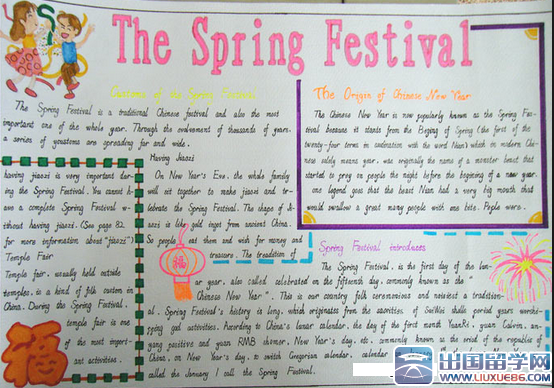
May the joy and happiness around you today and always.
愿快乐幸福永伴你左右。
Please accept my sincere wishes for the New Year. I hope you will continue to enjoy good health.
请接受我诚挚的新年祝福,顺祝身体健康。
Allow me to congratulate you on the arrival of the New Year and to extend to you all my bestwishes for your perfect health and lasting prosperity.
恭贺新禧,祝身体健康、事业发达。
Best wishes for the holidays and happiness throughout the New Year.
恭贺新禧,万事如意。
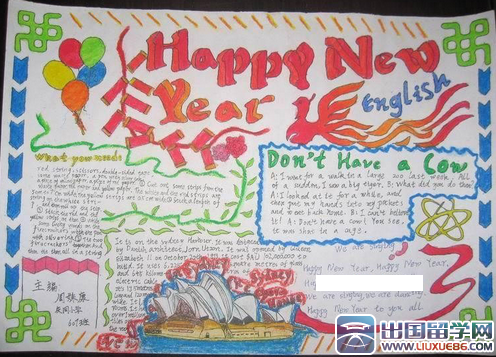
Take good care of yourself in the year ahead.
请多保重!
Wishing you many future successes.
祝你今后获得更大成就。
Please accept our wishes for you and yours for a happy New Year.
请接受我们对你及你全家的美好祝福,祝你们新年快乐。
May the coming New Year bring you joy, love and peace.
愿新年为你带来快乐,友爱和宁静。
Wishing you happiness during the holidays and throughout the New Year.
祝节日快乐,新年幸福。
更多内容尽在出国留学网:
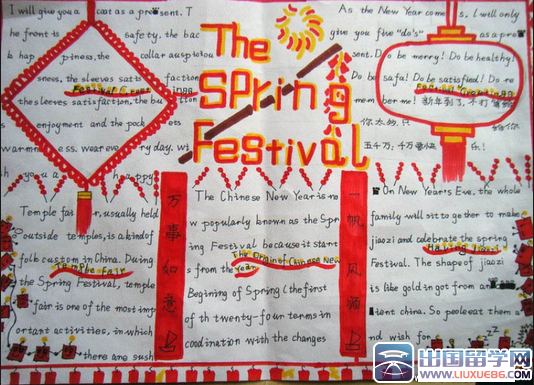
春节的由来 英文
Chinese New Year starts with the New Moon on the first day of the new year and ends on the full moon 15 days later. The 15th day of the new year is called the Lantern Festival, which is celebrated at night with lantern displays and children carrying lanterns in a parade.
The Chinese calendar is based on a combination of lunar and solar movements. The lunar cycle is about 29.5 days. In order to "catch up" with the solar calendar the Chinese insert an extra month once every few years (seven years out of a 19-yearcycle). This is the same as adding an extra day on leap year. This is why, according to the solar calendar, the Chinese New Year falls on a different date each year.
New Year's Eve and New Year's Day are celebrated as a family affair, a time of reunion and thanksgiving. The celebration was traditionally highlighted with a religious ceremony given in honor of Heaven and Earth, the gods of the household and the family ancestors.
The sacrifice to the ancestors, the most vital of all the rituals, united the living members with those who had passed away. Departed relatives are remembered with great respect because they were responsible for laying the foundations for the fortune and glory of the family.
The presence of the ancestors is acknowledged on New Year's Eve with a dinner arranged for them at the family banquet table. The spirits of the ancestors, together with the living, celebrate the onset of the New Year as one great community. The communal feast called "surrounding the stove" or weilu. It symbolizes family unity and honors the past and present generations.
春节的习俗 英文
The Chinese New Year celebrations are marked by visits to kin, relatives and friends, a practice known as "new-year visits" (Chinese: 拜年; pinyin: bài nián). New clothes are usually worn to signify a new year. The colour red is liberally used in all decorations. Red packets are given to juniors and children by the married and elders. See Symbolism below for more explanation.
Preceding days 春节前
This article does not cite any references or sources.
Please help improve this article by adding citations to reliable sources. Unsourced material may be challenged and removed. (January 2010)
On the days before the New Year celebration Chinese families give their home a thorough cleaning. There is a Cantonese saying "Wash away the dirt on ninyabaat" (年廿八,洗邋遢), but the practice is not usually restricted on nin'ya'baat (年廿八, the 28th day of month 12). It is believed the cleaning sweeps away the bad luck of the preceding year and makes their homes ready for good luck. Brooms and dust pans are put away on the first day so that luck cannot be swept away. Some people give their homes, doors and window-frames a new coat of red paint. Homes are often decorated with paper cutouts of Chinese auspicious phrases and couplets. Purchasing new clothing, shoes, and receiving a hair-cut also symbolize a fresh start.
In many households where Buddhism or Taoism is prevalent, home altars and statues are cleaned thoroughly, and altars that were adorned with decorations from the previous year are also taken down and burned a week before the new year starts, and replaced with new decorations. Taoists (and Buddhists to a lesser extent) will also "send gods" (送神), an example would be burning a paper effigy of Zao Jun the Kitchen God, the recorder of family functions. This is done so that the Kitchen God can report to the Jade Emperor of the family household's transgressions and good deeds. Families often offer sweet foods (such as candy) in order to "bribe" the deities into reporting good things about the family.
The biggest event of any Chinese New Year's Eve is the dinner every family will have. A dish consisting of fish will appear on the tables of Chinese families. It is for display for the New Year's Eve dinner. This meal is comparable to Christmas dinner in the West. In northern China, it is customary to make dumplings (jiaozi 饺子) after dinner and have it around midnight. Dumplings symbolize wealth because their shape is like a Chinese tael. By contrast, in the South, it is customary to make a new year cake (Niangao, 年糕) after dinner and send pieces of it as gifts to relatives and friends in the coming days of the new year. Niangao literally means increasingly prosperous year in year out. After the dinner, some families go to local temples, hours before the new year begins to pray for a prosperous new year by lighting the first incense of the year; however in modern practice, many households hold parties and even hold a countdown to the new lunar year. Beginning in the 1980s, the CCTV New Year's Gala was broadcast four hours before the start of the New Year.
First day 初一
The first day is for the welcoming of the deities of the heavens and earth, officially beginning at midnight. Many people, especially Buddhists, abstain from meat consumption on the first day because it is believed that this will ensure longevity for them. Some consider lighting fires and using knives to be bad luck on New Year's Day, so all food to be consumed is cooked the day before. For Buddhists, the first day is also the birthday of Maitreya Bodhisattva (better known as the more familiar Budai Luohan), the Buddha-to-be. People also abstain from killing animals.
Most importantly, the first day of Chinese New Year is a time when families visit the oldest and most senior members of their extended family, usually their parents, grandparents or great-grandparents.
Some families may invite a lion dance troupe as a symbolic ritual to usher in the Lunar New Year as well as to evict bad spirits from the premises. Members of the family who are married also give red packets containing cash to junior members of the family, mostly children and teenagers.
While fireworks and firecrackers are traditionally very popular, some regions have banned them due to concerns over fire hazards, which have resulted in increased number of fires around New Years and challenged municipal fire departments' work capacity. For this reason, various city governments (e.g., Hong Kong, and Beijing, for a number of years) issued bans over fireworks and firecrackers in certain premises of the city. As a substitute, large-scale fireworks have been launched by governments in cities like Hong Kong to offer citizens the experience.
Second day 初二
The second day of the Chinese New Year is for married daughters to visit their birth parents. Traditionally, daughters who have been married may not have the opportunity to visit their birth families frequently.
On the second day, the Chinese pray to their ancestors as well as to all the gods. They are extra kind to dogs and feed them well as it is believed that the second day is the birthday of all dogs.
Business people of the Cantonese dialect group will hold a 'Hoi Nin' prayer to start their business on the 2nd day of Chinese New Year. The prayer is done to pray that they will be blessed with good luck and prosperity in their business for the year.
Third and fourth days 初三
The third and fourth day of the Chinese New Year are generally accepted as inappropriate days to visit relatives and friends due to the following schools of thought. People may subscribe to one or both thoughts.
1) It is known as "chì kǒu" (赤口), meaning that it is easy to get into arguments. It is suggested that the cause could be the fried food and visiting during the first two days of the New Year celebration.
2) Families who had an immediate kin deceased in the past 3 years will not go house-visiting as a form of respect to the dead, but people may visit them on this day. Some people then conclude that it is inauspicious to do any house visiting at all. The third day of the New Year is allocated to grave-visiting instead.
Fifth day 初五
In northern China, people eat jiǎo zi (simplified Chinese: 饺子; traditional Chinese: 餃子), or dumplings on the morning of Po Wu (破五). This is also the birthday of the Chinese god of wealth. In Taiwan, businesses traditionally re-open on this day, accompanied by firecrackers.
Seventh day 初七
The seventh day, traditionally known as renri 人日, the common man's birthday, the day when everyone grows one year older. It is the day when tossed raw fish salad, yusheng, is eaten. This is a custom primarily among the overseas Chinese in Southeast Asia, such as Malaysia and Singapore. People get together to toss the colourful salad and make wishes for continued wealth and prosperity.
For many Chinese Buddhists, this is another day to avoid meat, the seventh day commemorating the birth of Sakra Devanam Indra.
Eighth day 初八
Another family dinner to celebrate the eve of the birth of the Jade Emperor. However, everybody should be back to work by the 8th day. All of government agencies and business will stop celebrating by the eighth day.
Ninth day 初九
The ninth day of the New Year is a day for Chinese to offer prayers to the Jade Emperor of Heaven (天宮) in the Taoist Pantheon. The ninth day is traditionally the birthday of the Jade Emperor. This day is especially important to Hokkiens. Come midnight of the eighth day of the new year, Hokkiens will offer thanks giving prayers to the Emperor of Heaven. Offerings will include sugarcane as it was the sugarcane that had protected the Hokkiens from certain extermination generations ago. Incense, tea, fruit, vegetarian food or roast pig, and paper gold is served as a customary protocol for paying respect to an honored person.
Tenth day 初十
The other day when the Jade Emperor's birthday is celebrated.
Thirteenth day 正月十三
On the 13th day people will eat pure vegetarian food to clean out their stomach due to consuming too much food over the last two weeks.
This day is dedicated to the General Guan Yu, also known as the Chinese God of War. Guan Yu was born in the Han dynasty and is considered the greatest general in Chinese history. He represents loyalty, strength, truth, and justice. According to history, he was tricked by the enemy and was beheaded.
Almost every organization and business in China will pray to Guan Yu on this day. Before his life ended, Guan Yu had won over one hundred battles and that is a goal that all businesses in China want to accomplish. In a way, people look at him as the God of Wealth or the God of Success.
Fifteenth day 正月十五
The fifteenth day of the new year is celebrated as yuán xiāo jié (元宵节), otherwise known as Chap Goh Mei in Fujian dialect. Rice dumplings tangyuan (simplified Chinese: 汤圆; traditional Chinese: 湯圓; pinyin: tāngyuán), a sweet glutinous rice ball brewed in a soup, is eaten this day. Candles are lit outside houses as a way to guide wayward spirits home. This day is celebrated as the Lantern Festival, and families walk the street carrying lighted lanterns.
This day often marks the end of the Chinese New Year festivities.
更多内容尽在出国留学网:
小编精心推荐
春节手抄报 | 春节小报 | 迎新年手抄报 | 春节资料 | 关于春节的作文
小编精心推荐

